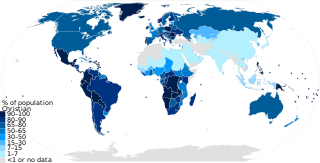
The World Factbook, also known as the CIA World Factbook, is a reference resource produced by the Central Intelligence Agency (CIA) with almanac-style information about the countries of the world. The official print version is available from the Government Publishing Office. The Factbook is available in the form of a website that is partially updated every week. It is also available for download for use off-line. It provides a two- to three-page summary of the demographics, geography, communications, government, economy, and military of 266 international entities, including U.S.-recognized countries, dependencies, and other areas in the world.

The Armed Forces of Equatorial Guinea consists of approximately 2,500 service members. The army has almost 1,400 soldiers, the navy 200 service members, and the air force about 120 members. There is also a gendarmerie, but the number of members is unknown. The Gendarmerie is a new branch of the service in which training and education is being supported by the French Military Cooperation in Equatorial Guinea. Military appointments are all reviewed by President Teodoro Obiang, and few of the native militiamen come from outside of Obiang's Mongomo-based Esangui clan. Obiang was a general when he overthrew his uncle, Francisco Macías Nguema.

The demographics of Nauru, an island country in the Pacific Ocean, are known through national censuses, which have been analysed by various statistical bureaus since the 1920s. The Nauru Bureau of Statistics have conducted this task since 1977—the first census since Nauru gained independence in 1968. The most recent census of Nauru was on 30 October 2021, when population had reached 11,680 people. The population density is 554 inhabitants per square kilometre, and the overall life expectancy is 63.9 years. The population rose steadily from the 1960s until 2006 when the Government of Nauru repatriated thousands of Tuvaluan and I-Kiribati workers from the country. Since 1992, Nauru's birth rate has exceeded its death rate; the natural growth rate is positive. In terms of age structure, the population is dominated by the 15–59-year-old segment (57%). The median age of the population is 21.6, and the estimated gender ratio of the population is 101.8 males per 100 females.
An associated state is the minor partner or dependent territory in a formal, free relationship between a political territory and a major party—usually a larger nation.

As of the year 2021, Christianity had approximately 2.38 billion adherents and is the largest religion by population respectively. According to a PEW estimation in 2020, Christians made up to 2.38 billion of the worldwide population of about 8 billion people. It represents nearly one-third of the world's population and is the largest religion in the world, with the three largest groups of Christians being the Catholic Church, Protestantism, and the Eastern Orthodox Church. The largest Christian denomination is the Catholic Church, with 1.3 billion baptized members. The second largest Christian branch is either Protestantism, or the Eastern Orthodox Church.
The following are the international rankings of Taiwan.

NATO is an international military alliance consisting of 32 member states from Europe and North America. It was established at the signing of the North Atlantic Treaty on 4 April 1949. Article 5 of the treaty states that if an armed attack occurs against one of the member states, it shall be considered an attack against all members, and other members shall assist the attacked member, with armed forces if necessary. Article 6 of the treaty limits the scope of Article 5 to the islands north of the Tropic of Cancer, the North American and European mainlands, the entirety of Turkey, and French Algeria, the last of which has been moot since July 1962. Thus, an attack on Hawaii, Puerto Rico, French Guiana, the Falkland Islands, Ceuta or Melilla, among other places, would not trigger an Article 5 response.
Monoethnicity is the existence of a single ethnic group in a given region or country. It is the opposite of polyethnicity.

Adherents of Islam constitute the world's second largest religious group. A projection by the PEW suggests that Muslims numbered approximately 1.9 billion followers in 2020. Studies in the 21st century suggest that, in terms of percentage and worldwide spread, Islam is the fastest-growing major religion in the world, mostly because Muslims have more children than other major religious groups. Most Muslims are either of two denominations: Sunni or Shia. Islam is the majority religion in several subregions: Central Asia, Western Asia, North Africa, West Africa, the Sahel, and the Middle East. The diverse Asia-Pacific region contains the highest number of Muslims in the world, surpassing the combined Middle East and North Africa.
Basic intelligence is fundamental or factual information about a foreign country, organization or issue that is collected and produced in intelligence reports by an intelligence organization. In the U.S. Intelligence Community, the CIA World Factbook is the best known basic intelligence publication. The U.S. Department of Defense uses the term "General Military Intelligence" for military basic intelligence.





